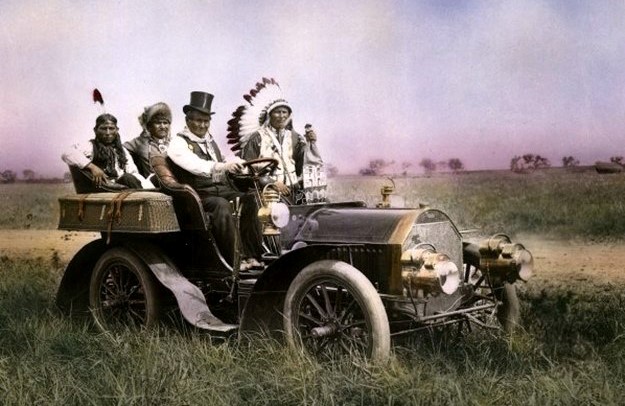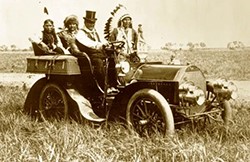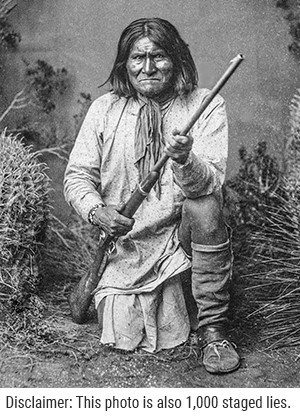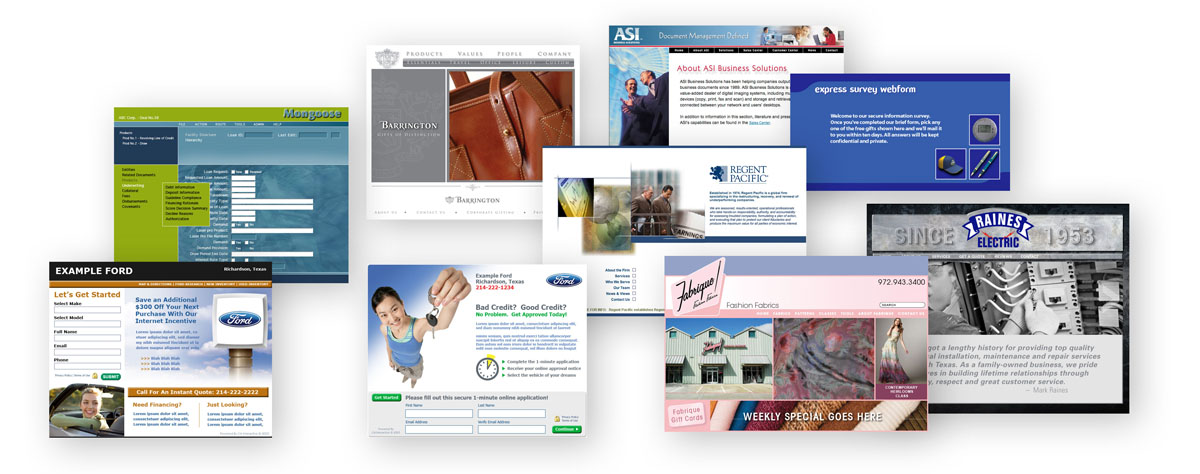A Picture is Worth 1,000 Lies

A Picture Is Worth a Thousand Lies
A few of them are convincing.
In Keeping With My Automotive Theme
The above photo implicitly communicates some of those convincing whoppers. Reportedly taken on June 5, 1905, this photo of famed Apache warrior, Geronimo, inspired Michael Martin Murphey’s 1972 hit song “Geronimo’s Cadillac”. In a 1987 interview, Murphey explained, “It was every irony I could ever think of about our culture in two words.” Problem is, none of it was true.
Tacit Lie Number One: You might view the photo and think it’s a remarkably good color snapshot. It’s not. Autochrome, the first practical color photographic film, was introduced in France by Auguste and Louis Lumière two years after this photo was taken. This is at best a hand-tinted version if not Photoshop (albeit, pretty good work).
Tacit Lie Two: This is no snapshot. It is a carefully orchestrated and posed photographic essay intended to communicate how the backwards natives had been brought into the modern era. At the time this image was made, occupants of that vehicle were prisoners of war at Fort Sill Oklahoma. They were not likely participating out of their own desire. On this particular day, Geronimo and crew were trotted out as one of the attractions at the Miller brothers’ 101 Ranch in Oklahoma.
Misperception Three: (This one only rises to the level of “misperception” because it’s based wholly on your interpretation rather than the original intent). Geronimo is not the guy in full Indian headdress. That’s Edward LeClair Sr., wearing a Ponca chief’s ceremonial headdress. Neither is Geronimo the tough looking single-feathered gangbanger type, glaring at the camera from the back seat. Geronimo is the “driver” dressed entirely in modern (for that day) white man’s clothing, including the natty top hat.
The Marketing Lie: Despite the catchy song title, that’s no Cadillac. It’s a 1904 Locomobile Type-C. Geronimo never owned an automobile or learned to drive. He remained a prisoner of war until he fell off a horse four years after this photo was taken. During his recovery, he contracted Pneumonia and died at Fort Sill.
The Social Lie: Geronimo is almost always portrayed as the “noble savage”, and a victim of the Imperialist Europeans who took away his land. While most of the atrocities attributed to the European settlers are true, Geronimo was no gentle creature, clad in leather and beads. He was a warrior, a descendant of a warrior tribe, famous for leading bands of raiders. He was a professional killer.
Those raids were not just desperate thefts of sustenance. They were military attacks on families, particularly those living on unprotected farms outside of cities. Those raiding parties famously tortured and killed the men but kept the women for sport or slavery. In short, Geronimo, was a hostile, self-serving human being who was simply subdued by a more powerful and well-armed group of hostile, self-serving human beings. He would have been right at home in our current society.
So, how much more of history have we taken for granted as being true? Historians, after all, are just self-serving human beings like you and me but with their own levels of hostility and philosophical axes to grind. Even worse, how much of our understanding about history is tainted by the re-interpretations of Hollywood sociopaths?
Want to convince me that Native Americans were the precursors to 1960’s peace-and-love hippies, and were not in the business of robbing, raping, killing, and enslaving other tribes — in essence, that they were somehow more refined than every other human being that ever walked this planet? Let’s talk.
Special Thanks
Thanks to my friend Don Christian for forwarding the article about Geronimo’s Cadillac to me. CLICK HERE to read the original for yourself. The blog is an impressive, yet obscure, collection of automotive-related writings, and their story about Geronimo’s Cadillac provided much of the content for today’s article. Don only discovered it because, as the sole remaining conservative in San Francisco, he has been legally quarantined to his own home and has infinite internet-browsing time on his hands. I’m seriously considering starting a GoFundMe page with the purpose of hiring a Seal team to sneak ashore and spirit Don back to Texas.
Original image, taken in 1905. Given the coloration, it is most likely an Albumen print.


1904 Cadillac (Left) and 1904 Locomobile (Right) were somewhat similar but with distinctly different designs. The Cadillac engine was beneath the seat and it had a prissier front-end. Interestingly, the later, 1920 Locomobile Model 48 eerily resembled the 1921 Oldsmobile truck made famous by the Beverly Hillbillies.
 Want to talk about American history or Human nature? Email me at guy@lawsoncomm.com. We can meet for coffee and I’ll even buy. If you want to talk about politics or religion, we might need to meet for something stronger to drink.
Want to talk about American history or Human nature? Email me at guy@lawsoncomm.com. We can meet for coffee and I’ll even buy. If you want to talk about politics or religion, we might need to meet for something stronger to drink.
![]()
I should never have surrendered. I should have fought until I was the last man alive.
— Geronimo


Did someone forward this newsletter to you after reading it themselves? Don’t settle for that!
CLICK HERE
to get a fresh, unused copy of this newsletter sent directly to you every Sunday morning. If you decide it stinks, you can always unsubscribe.
The History of The United States
— Allen C. Guelzo, Gary W. Gallagher, Patrick N. Allitt
If you’re tired of the deconstructionist babbling and would just like to hear the objective and documented history of the U.S. from recognized historians, this book’s for you. It’s part of the “Great Courses” series offered FREE by Audible. The Great Courses Series is an entire collection of college level lectures in everything from History to Literature to Science to Philosophy, and more — all from recognized PhD’s in their respective fields. You can assimilate all the knowledge of a college degree without the scam of low-interest tuition loans or having to endure a Woke environment.
A meeting of great minds who think alike












